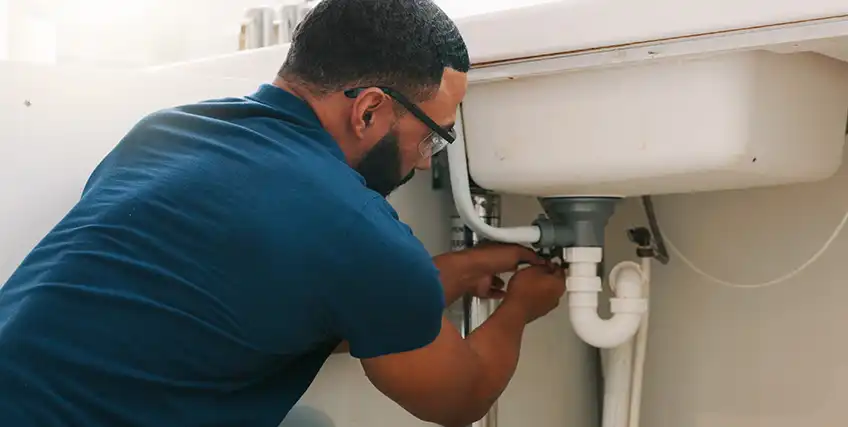Expanding Operations: Using Business Loans to Grow Plumbing and HVAC Services
March 11, 2025 | Last Updated on: March 11, 2025

Expanding Operations: Using Business Loans to Grow Plumbing and HVAC Services
Owning an HVAC and or plumbing business can be a rewarding way to make a good income. But scaling from owner/operator to a business that has several employees and serves a city or region often requires more than technical knowledge and good customer service. HVAC and plumbing companies may need a plumbing business loan to grow the business.
This article explores the benefits of plumbing business loans and HVAC financing. You’ll also learn the types of funding available to meet your business needs.
Benefits of Financing for HVAC and Plumbing Contractors
Running a growing HVAC business or plumbing company requires a significant amount of capital. There’s payroll , rent, utility bills, materials, insurance and licensing, to name a few expenses. Whether your finances are tight due to a slow season, or if you need extra capital because you’re trying to expand your business, here are a few ways HVAC and plumbing business loans can help:
Improve Cash Flow Management
Plumbing and HVAC projects can take some time to complete. Depending on where you live, you might also encounter seasonal demands and lows, which can cripple your cash flow. You also likely have significant upfront costs of maintaining your operations before a customer repays you.
This can disrupt your cash flow and hamper your company’s ability to maintain its operations efficiently. A plumbing business loan can boost your cash flow and serve as a buffer between your business’s expenses and accounts receivables.
Fund Equipment and Inventory Purchases
Having the right equipment and tools is essential to your operations. The equipment needed will depend on your business’s particular operations.
Plumbing companies often need the following equipment:
- hand tools and power tools
- safety gear
- pipe expanders
- inspection cameras
- snake machines
- augers
- mini-excavators, and more
Plus, there are costs associated with purchasing the necessary parts to complete your plumbing jobs. A plumbing business loan can get you the funds needed to purchase equipment for your company.
HVAC contractors and installers also need specialized equipment, including:
- basic hand tools
- power tools
- safety equipment
- diagnostic tools
- saws
- multimeters
- thermometers
- psychrometers
Contractors usually need to keep an up-to-date inventory of parts and equipment to repair and replace their customers’ units. Funding these expenses requires significant working capital.
An equipment loan is a type of plumbing business loan that can help you get the capital to fund these equipment purchases. The good thing about equipment loans is that the items purchased with loan funds are collateral for the loan. So, it’s often easier to get an equipment loan than other types of plumbing business loans.
Grow Your Business or Expand Operations
Your plumbing or HVAC business can expand its operations in several ways.
- Hire more workers and technicians to meet more demand and service more customers
- Buy more service trucks
- Open a new location in another city
Either way, a business expansion loan can help maximize your revenue and take your business to the next level.
Refinance Current Business Debt
A plumbing business loan can help you consolidate company debt into one streamlined payment. This can help free up more cash flow to optimize your business’s operations. There’s also a potential to secure funding at a lower interest rate. This can help you save on the total amount paid across all your business debt, ultimately improving your bottom line.
Commercial HVAC Financing Options and Plumbing Business Loans
There are several financing and loan options for plumbers and HVAC contractors, each meeting a specific need.
These include:
- Term Loans: A term loan offers a predetermined loan amount upfront with monthly payments, including interest, until the loan is paid off. A term loan can be a short-term or long-term plumbing business loan, depending on the lender and how you use the loan funds.
- Equipment Financing: Equipment loans fund the purchase of equipment assets, including vehicles, IT systems and computers, contractor equipment, HVAC units, and more. The loan term will usually not exceed the useful life of the equipment.
- Working Capital Loans: A working capital plumbing business loan offers funds to meet short-term business obligations and help pay for operational expenses. This type of loan has a shorter repayment term, usually anywhere from one to five years.
- Business Credit Cards: A credit card can help you pay for unexpected business expenses or emergencies. As with personal credit cards, you can spend up to a set credit limit and repay it monthly with interest. A business credit card can help you build business credit and facilitate better cash flow management.
- Business Line of Credit: This works a lot like a credit card, in that you’re approved up to a certain credit ceiling. With a line of credit, you pay interest only on the amount borrowed each month, and as you repay it, the credit limit resets.
- Merchant Cash Advance: MCAs are a type of revenue-based financing that provides fast cash in exchange for a percentage of future sales.
- SBA loans: These loans are backed by the U.S. Small Business Administration, which makes reduces risk for lenders. As such, SBA loans often have better terms than traditional bank loans, but the loan application process can be more time consuming and it may take longer to receive funding. SBA loans include:
- SBA 7(a) loans: This is the SBA’s main loan program for small business owners. The maximum loan amount for 7(a) loans is $5 million. You can use 7(a) loan funds for diverse needs, including working capital, refinancing business debt, or purchasing equipment
- SBA 504 loans: A 504 loan offers fixed-rate long-term financing for up to $5 million. Like 7(a) loans, the approval process can be lengthy, so this would not be considered a “fast funding” option. 504 loans cannot be used for working capital. But they can be used for debt consolidation or refinancing, existing commercial real estate purchases, or buying equipment with a 10-year or more useful life.
- SBA microloans: Microloans offer business funding for up to $50,000. They are a popular option for startups and small businesses that want to expand. You can utilize a microloan for working capital, equipment, inventory, furniture, and similar needs. However, you can’t use a microloan for real estate or to pay off existing debt.
Types of Small Business Loan Providers
Plumbers and contractors can seek funding from two primary types of lenders: traditional lenders and alternative or online loan providers.
Traditional Lenders
Banks and credit unions are considered traditional lenders. Traditionally, this is the primary way small business owners received plumbing business loans. Traditional lenders tend to offer brick and mortar locations, although many now have online options as well, and many have deep roots in their local communities, so business owners may be able to build relationships with their bankers.
A downside to traditional lenders is that they tend to have strict lending criteria and it may take longer to get your application approved and then receive funding than it would with an online lender.
On the plus side, if you’re able to get approval, they often have good repayment terms.
Traditional lenders typically offer several types of financing/plumbing business loan products. These include:
- business credit cards
- commercial real estate loans
- term loans
- equipment financing
- business lines of credit
- SBA loans
Alternative Lenders and Online Commercial Loan Specialists
Alternative loan specialists have become a popular funding solution for business owners. These online lenders usually offer several flexible loan solutions.
These include:
- commercial real estate financing
- equipment loans
- working capital loans
- term loans
- merchant cash advances or revenue-based financing
- SBA loans
Experienced alternative loan specialists can usually provide fast funding.
Final Thoughts
If you’re ready to scale your HVAC or plumbing business, there are ample financing solutions you can explore.
Partnering with a seasoned small business loan specialist can help you get the plumbing business loan you need to stay relevant in the competitive HVAC and plumbing industries.
FAQs
What will I need to apply for business financing?
You’ll need a business plan showing how you plan to use the funds, as well as tax returns, financial statements, credit report, and bank statements.
What type of credit score is needed for a small business loan?
The different types of lenders will have their own underwriting requirements, but a good rule of thumb is that you’ll want a credit score of 650 or higher.
Can I get a plumbing business loan or commercial HVAC financing if I have bad credit?
Owners of HVAC or plumbing companies will have an easier time getting business financing with an alternative loan specialist if they have bad credit. Solutions like revenue-based financing and equipment loans may be the easiest to get.
What else do lenders evaluate besides creditworthiness when evaluating a loan application?
Lenders evaluate things like time in business, financial statements, and what the financing will be used for to ensure that they have a good likelihood of being repaid.
What is the best financing for HVAC contractors?
The best financing solution is often one that provides funding when it’s needed to facilitate a business's need or ensure growth. Traditional lenders and the SBA have lengthy application processes, and that often means missed opportunities. For that reason, many business owners prefer alternative lenders who offer fast funding options.




